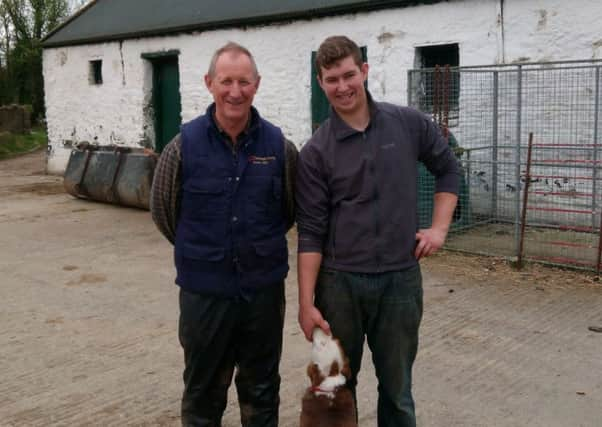Border-straddling farmers adopt a stoic approach to Brexit worries


“Throw your leg over that fence and you’re across,” he said.
The Crockett farm spans both sides of the border between Londonderry and Donegal.
Advertisement
Hide AdAdvertisement
Hide AdGordon, in his early 20s, is determined to carve out a living on the family farm despite the challenges that might lie ahead when the UK’s exit from the EU is complete.
He is clearly concerned about the prospect of the farm being split in two post-Brexit but takes a philosophical approach to the vexing border question.
“The ground is there and it still needs farmed,” he explained. “There’s always going to be a certain amount of people who’re going to back British farming.”
Gordon will some day take over the farm from his father, David, who has adopted a similarly stoic approach to the prospect of a hard border splitting his land in two.
Advertisement
Hide AdAdvertisement
Hide Ad“For the whole of Europe we’re not going to mean one toss,” David said. “Whatever I do or whatever I say is not going to make any difference. You just have to get on with it.”
David’s age and his own experience of working a border-straddling farm in the days before the UK joined the EEC does, however, make him more acutely aware of the potential difficulties the farm might face.
He recalls strict customs posts and being forced to take a circuitous route across arterial roads with farm vehicles to cross the border in the 1970s, rather than a short journey between one part of the farm and another. He can also recount his grandfather’s stories of being suddenly faced with the realities of partition in the early 1920s.
David walks to one of the spots on the farm where the border intersects to illustrate his point. We arrive at a ditch between fields.
Advertisement
Hide AdAdvertisement
Hide Ad“My grandfather, he was milking cows and sending the milk into Derry. He came up here to milk the cows – this would have been at the end of March, 1923. That was at partition, when the border started closing up.”
He points to a gate between a hedgerow: “He brought them in here, and the customs man was standing fair there. It was two different countries.”
David said that his grandfather’s health was badly affected by the extra strain of dealing with the bureaucracy associated with the new border.
“My grandfather’s name was Henry Crockett,” he said. “He had come from farming stock in Donegal. There were about seven or eight of them and he went into Derry to work, him and his brother.
Advertisement
Hide AdAdvertisement
Hide Ad“Henry worked in the shirt factory. He came in and bought this land in 1911, just before the First World War. His health was affected big time – by the bureaucracy, the customs men.”
He recalled the days before the restrictions were relaxed in the 1970s.
“You had to go right the way around, fill in a form, and you handed that in. Sometimes you had to go right in through Whitehouse, in Derry (city), to bring the straw down through there every time.
“That’s before we were in the EU. If you have a customs union, you could still bring it this road, but if you don’t, that’s what we’re looking at.
Advertisement
Hide AdAdvertisement
Hide Ad“When we entered the EEC, that’s when the border controls came down.”
The restrictions haven’t disappeared completely, though, as son Gordon explained.
“We have cattle on both sides – the Northern ones are over there and the southern ones are there,” he said. “You can’t just turn round and say the price is better on one side. You can’t take animals freely like that anyway.”
Whatever challenges Brexit has in store, the Crocketts will meet them head on.